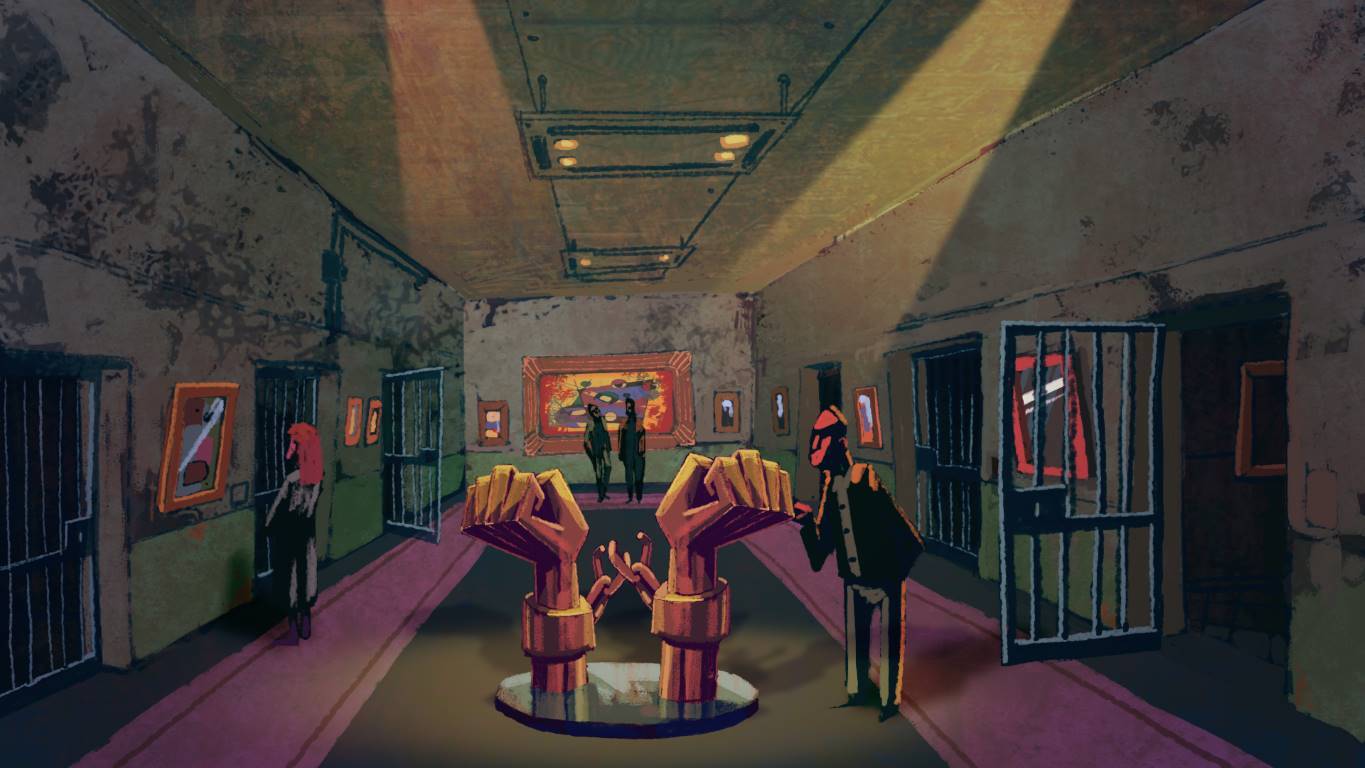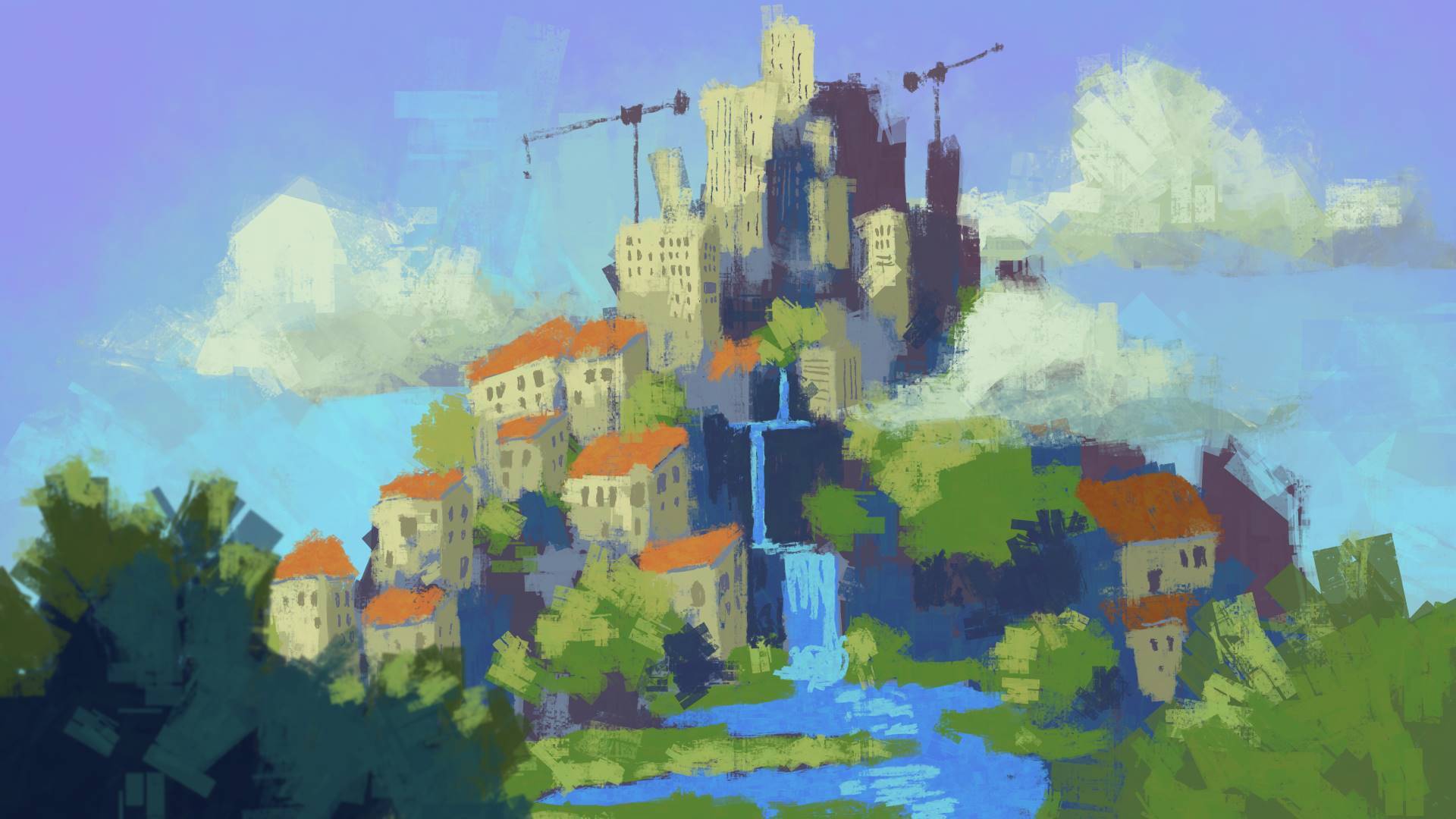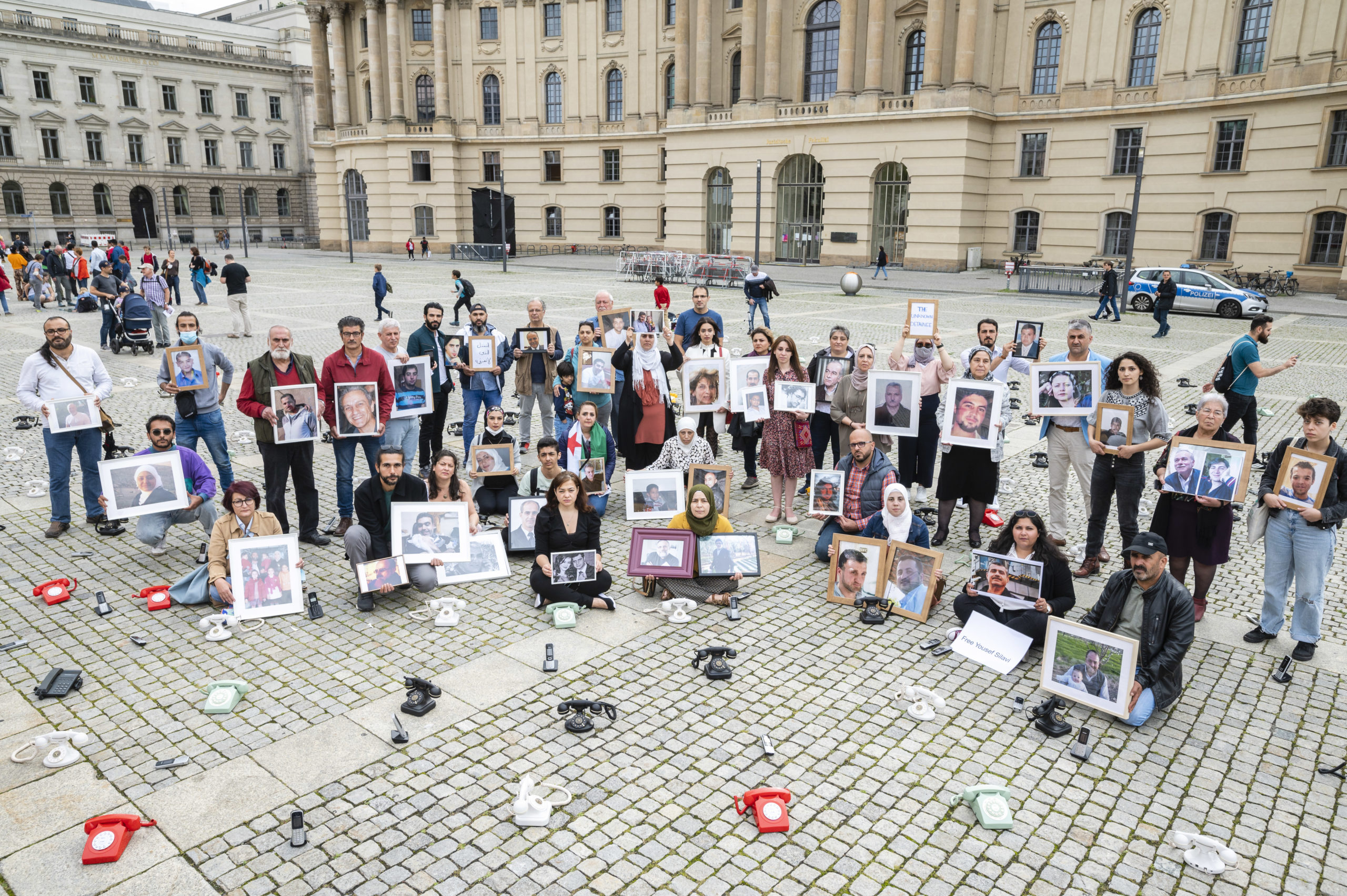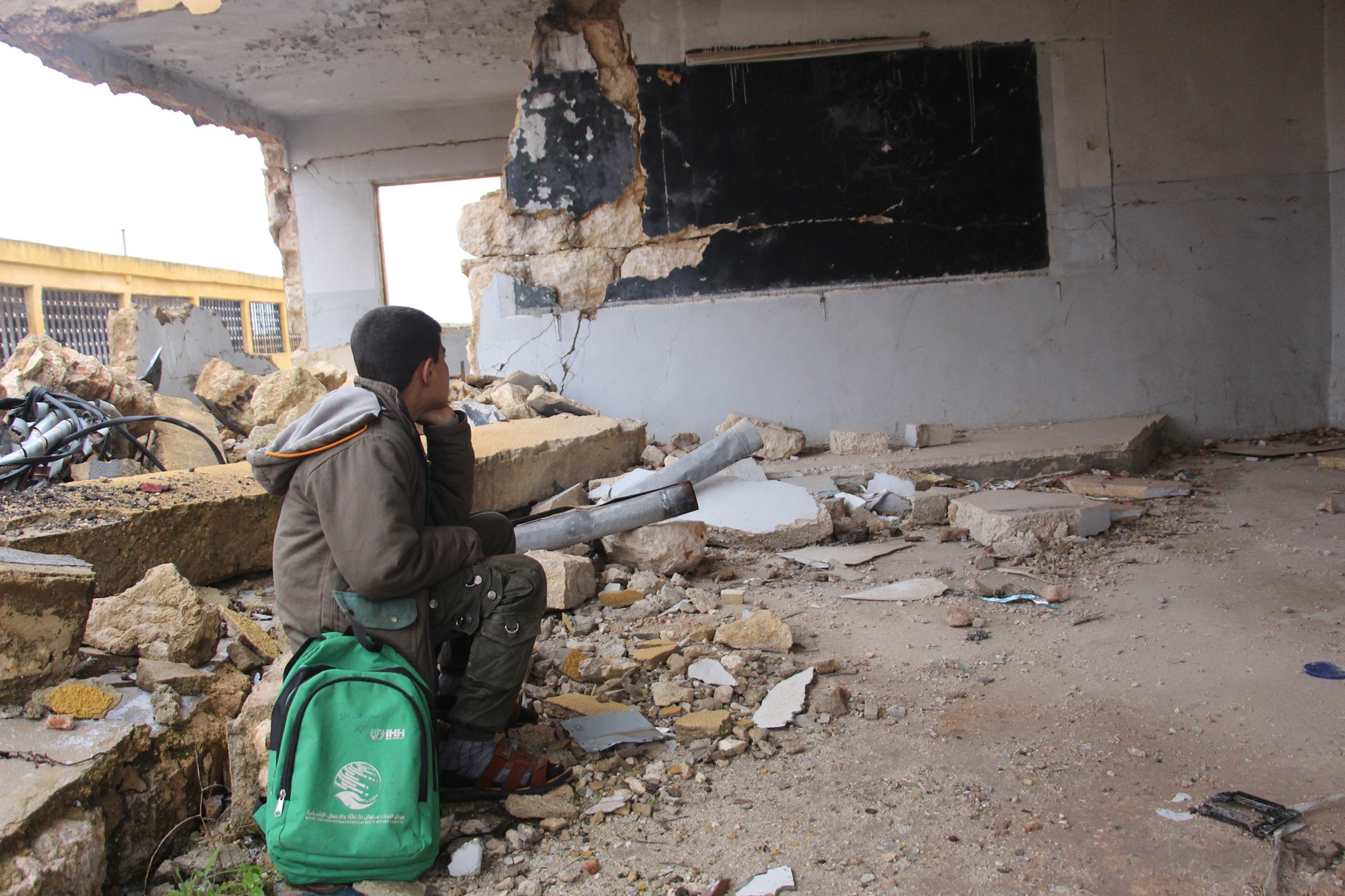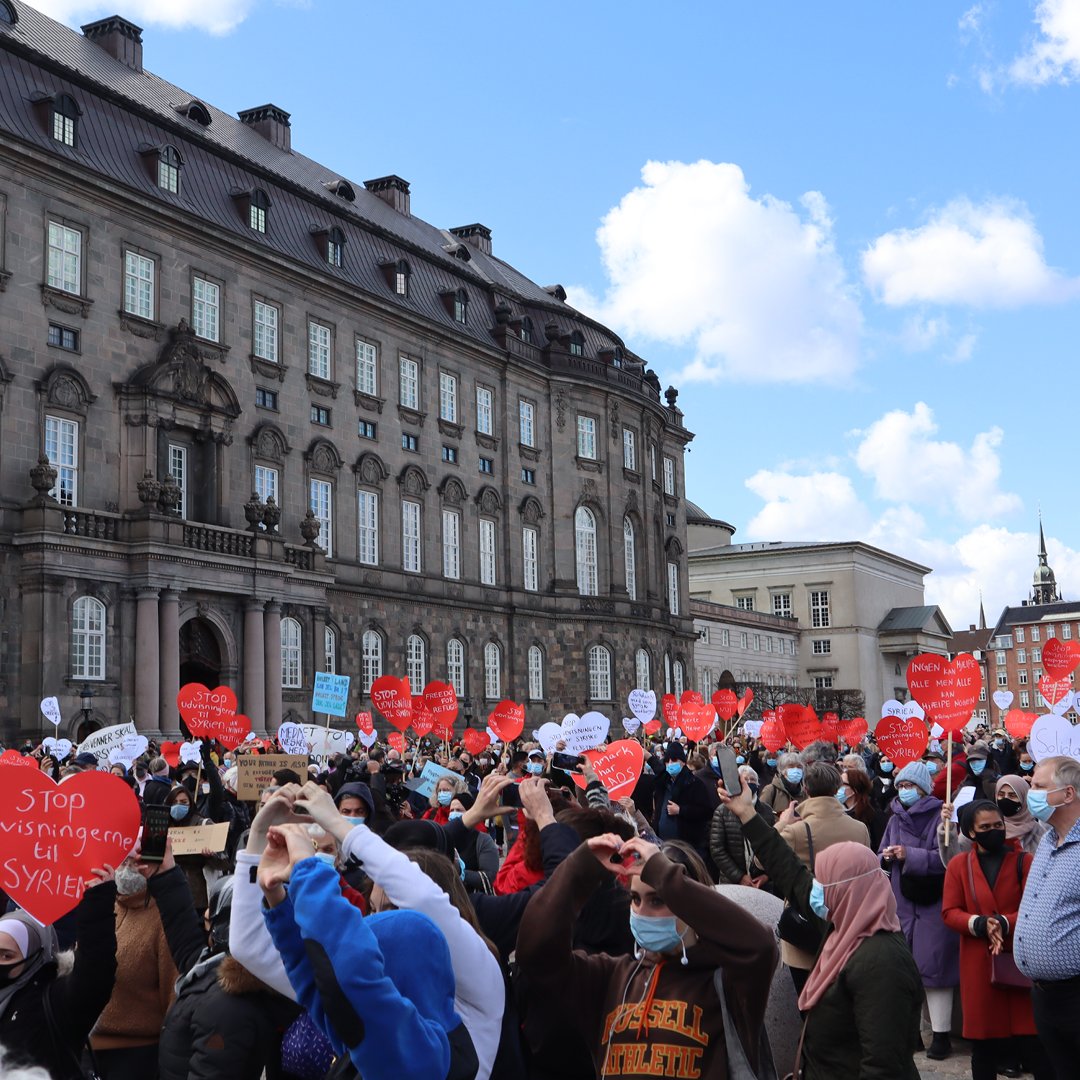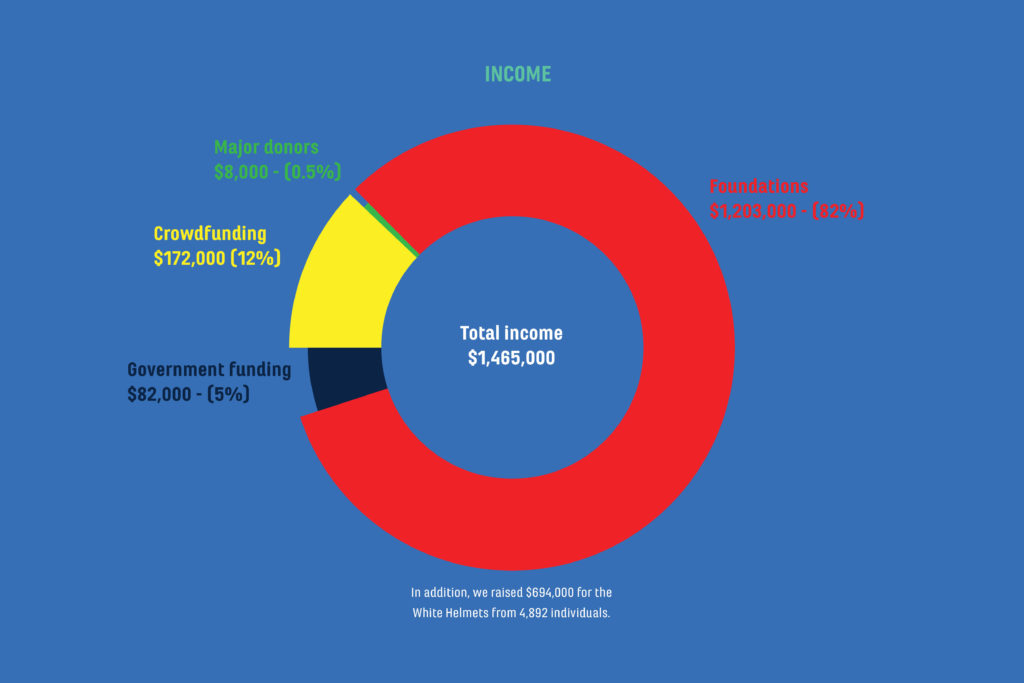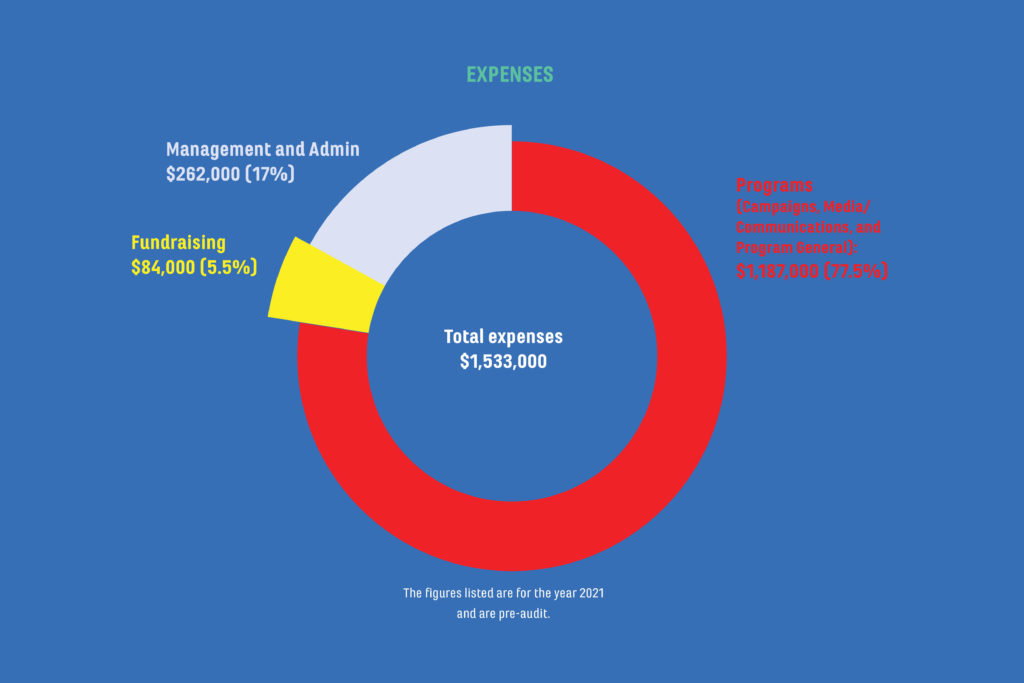Letter from our Executive Director
2021 marks ten years on from the start of the Syrian revolution. It marks that moment of hope and courage that took so many men and women out onto the streets to demand an end to decades of dictatorship. It reminds me of the excitement, the fear, the solidarity I felt the first time I chanted for freedom in an old Damascene neighbourhood.
Ten years has also shocked us into a state of disbelief. I never thought I would be reflecting on ten years of barrel bombs, chemical attacks, seiges, detention and the worst human rights abuses of our time. Even if we were not surprised by the brutality of the regime, we never could have comprehended a world in which these crimes would be allowed to continue year after year after year, with impunity and with the rubber stamp silence of the international community.
It was with this mix of emotion that we, The Syria Campaign team, asked Syrian activists to imagine what Syria would look like if their demands for freedom and democracy had been heard ten years ago. We asked them to describe what Syria would look like now if Assad had stepped down in response to the revolution.
I, of course, have my own imaginary Syria. A country that embraces the culture of citizenship, with its freedom, democracy, secularism and critical thinking. My mentor writer and thinker Hassan Abbas passed away in March of this year and this is a vision that he instilled in me. A huge loss to humanity, Abbas promoted arts and culture when Assad was trying to shut down imagination and free thinking.
It is with this vision that we go about our work. This year we have highlighted the ongoing human rights abuses that continue to be meted out against civilians in Syria hoping to show Denmark and other European countries that Syria is not yet safe for refugees to return home. People continue to be arbitrarily detained and disappeared, hospitals and schools continue to be bombed, children and teachers killed as they walk to school or study. Even without this stark evidence, refugees should never be forced to return to a country they have fled from – yet racist attitudes towards refugees are being written into hostile policies.
In our darkest moments, it’s tempting to ask why we should continue to campaign for peace, freedom and democracy when political will has seemingly dropped to zero and international justice mechanisms are apparently unable to hold war criminals to account. But it is these very moments that give us the energy to continue. The teachers working under bombs in Idlib, the humanitarians who continue to pull children from the rubble of bombed out buildings, the medics responding to COVID in a devastated health system, the families calling for the release of their loved ones and a halt to their ongoing detention, need our support now more than ever.
Dictators win by convincing us that our hopes are worthless. When it feels like no one is listening, we must show those risking their lives to save others that humanity is with them, that the dreams that compelled us onto the streets ten years ago are real and absolutely possible.
Laila Kiki, Executive Director
2021 in numbers
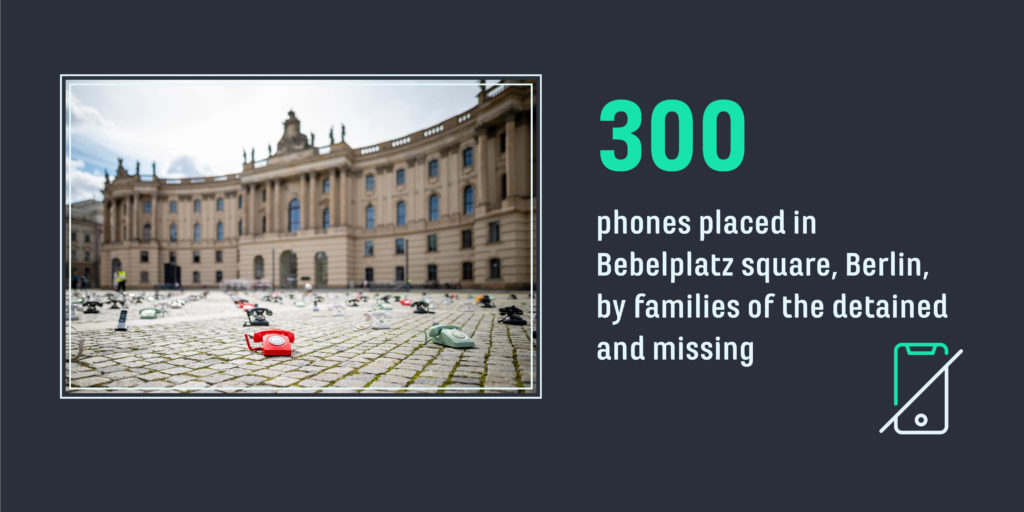
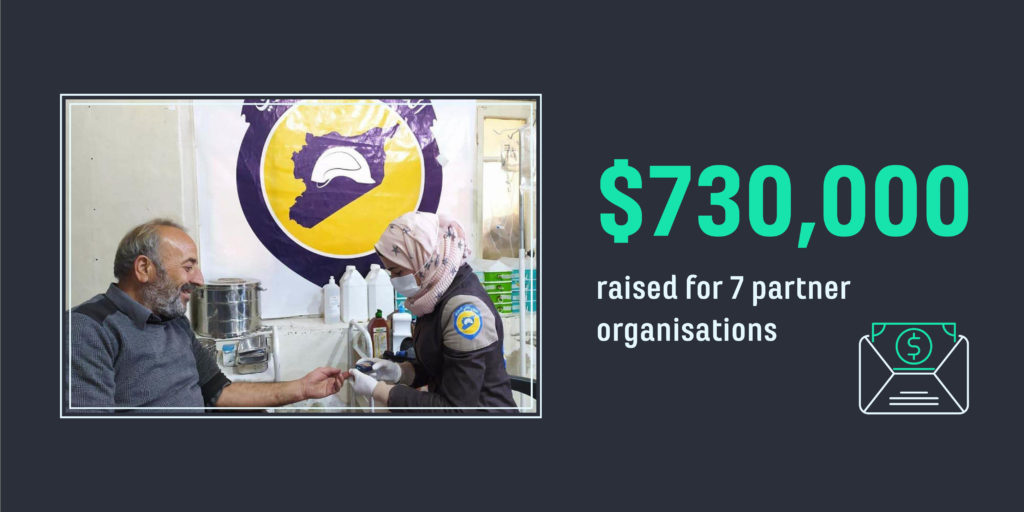
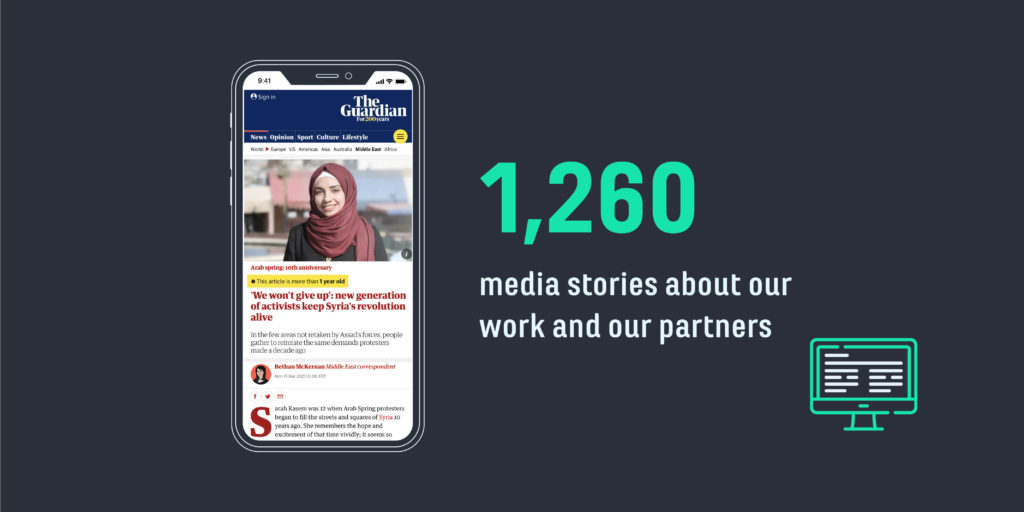
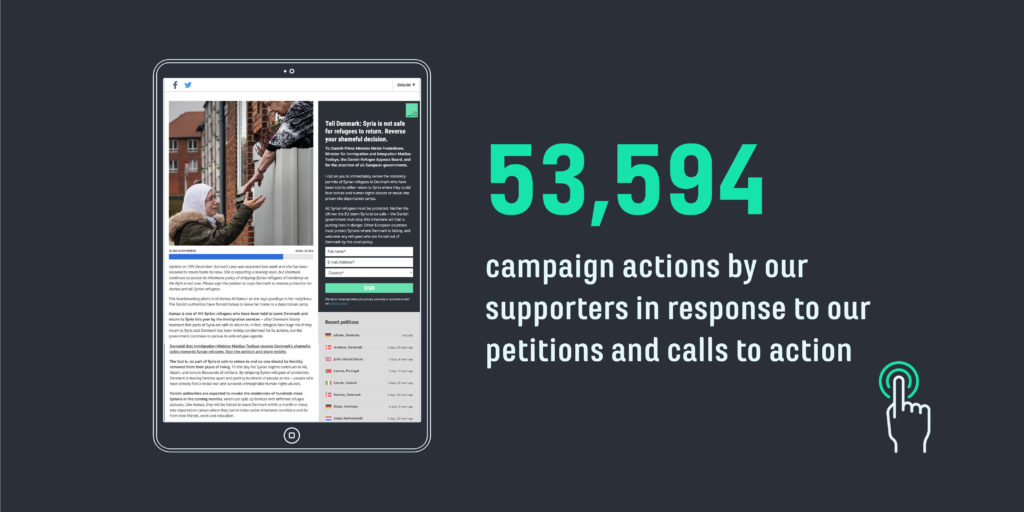
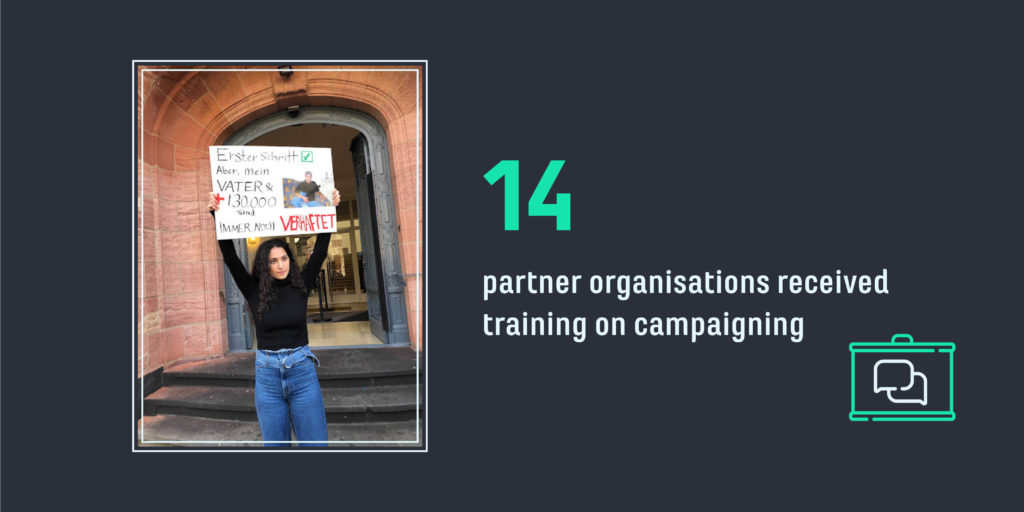
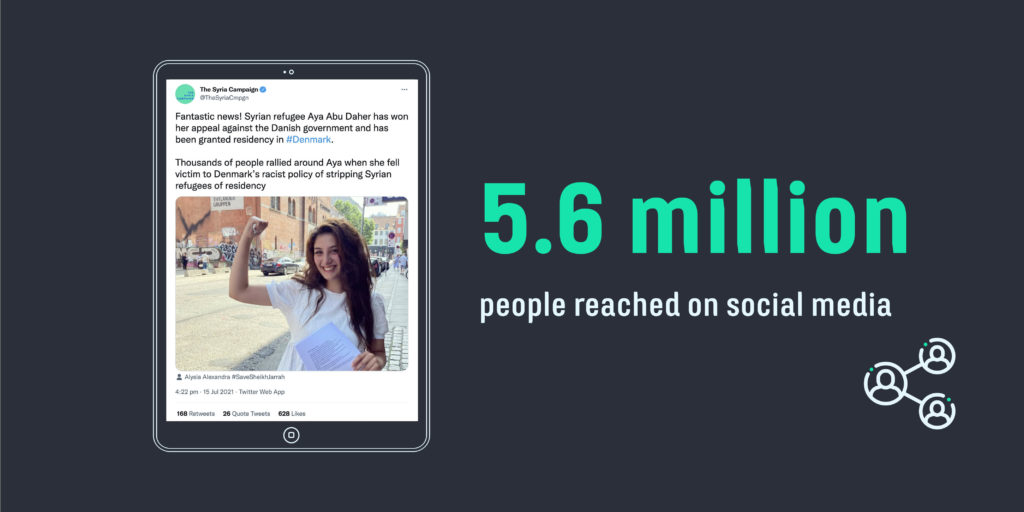
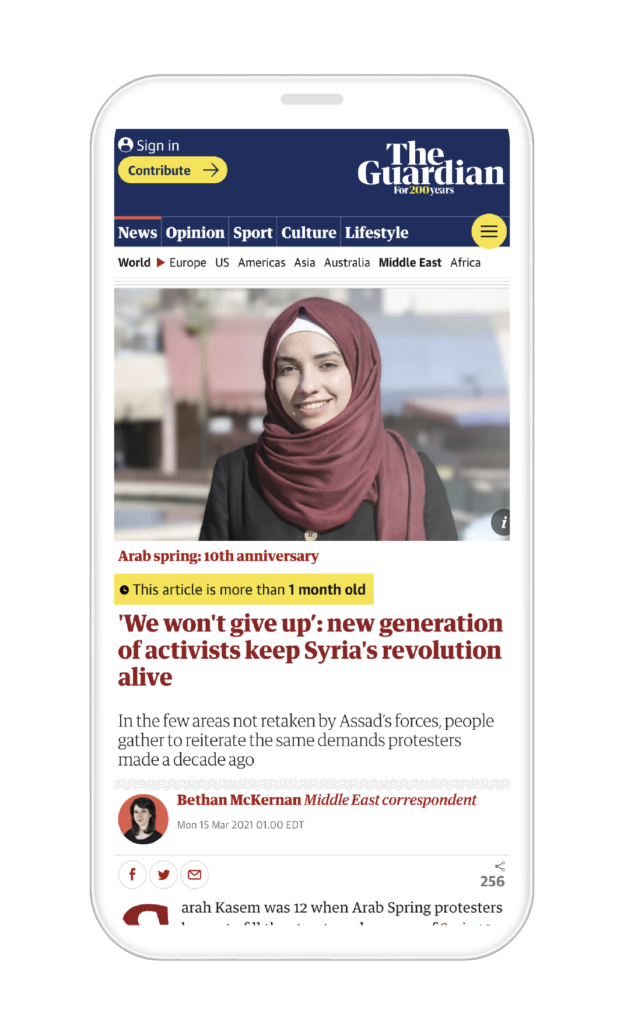
March 2021 marked ten years since campaigners, full of hope and anticipation, bravely went out onto the streets and into the squares to protest decades of dictatorship and human rights abuses. Ten years on, The Syria Campaign has the privilege to work with many extraordinary human beings who continue to hold onto that hope and push towards democracy and human rights in Syria.
We celebrated their relentless dedication by highlighting the work of female journalists in Idlib, humanitarian workers, civil society organisations, medics and activists. Their fierce dedication was covered by The Guardian, BBC’s Today programme and World Tonight, CNN, ITV news, Channel 4 news, Sky news and Marie Claire.
“My generation is still carrying the same hopes for justice and freedom. We will not give up on what the older generation started.”
Sarah Kassem in The Guardian
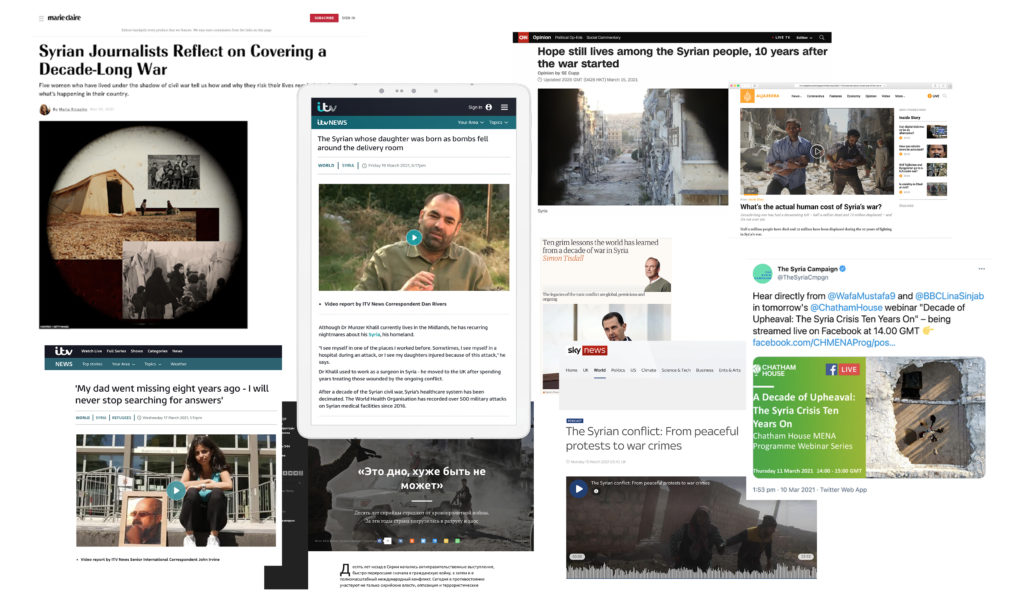
We are so proud of the short film we made with the Syrian animator, Waref Abu Quba, and illustrator, Salam Alhassan, to mark ten years since the start of the revolution. We asked seven Syrian activists to imagine what their world would look like today had Bashar al-Assad stepped down in 2011.
Each was able to reflect on a different area of Syrian life. We wanted the video to be a reminder of what Syrians dreamed of when they took to the streets and what many continue to struggle for.
“It was a reflection moment that we all need every now and then to realign our goals and agendas. It was a reminder of the root causes of why we are here today, and what alternative reality we could have had, had the world not failed us”
SAWSAN ABOU ZAINEDIN, ARCHITECT AND URBAN PLANNER
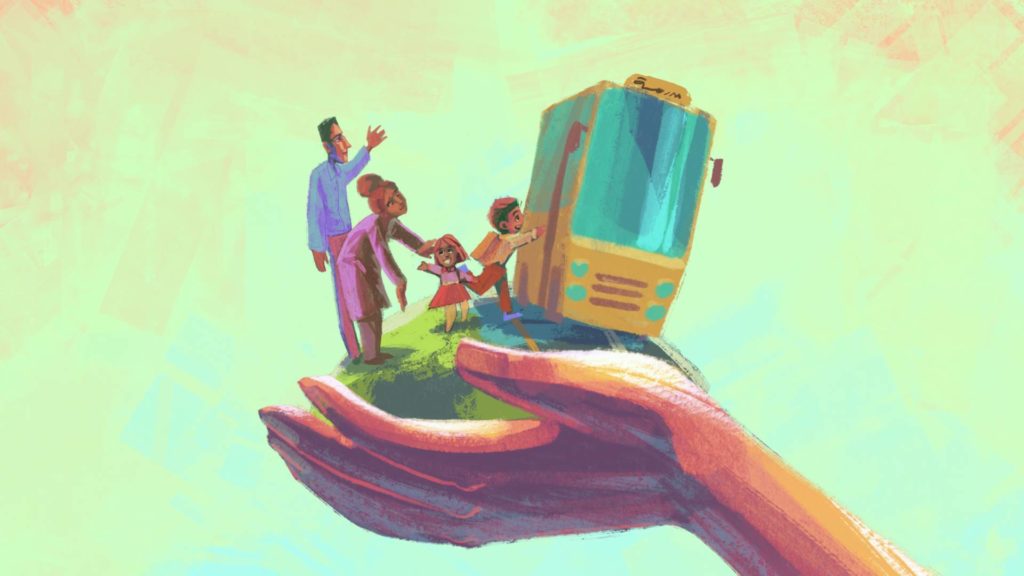
The response on Facebook, Twitter, Instagram and YouTube matched our ambition with thousands of views and the film was our most liked Instagram post ever. It was covered by ITV News and France 24 and shared by influential social media accounts.
“I am honoured to have had the opportunity to work on the “What if? Syria Ten Years” film with such wonderful Syrian talents. To be able to dream and tell our version of the Syrian story. I am most grateful to The Syria Campaign for their efforts and for making this film possible. An absolute highlight project of 2021 for me.” Waref Abu Quba – Filmmaker
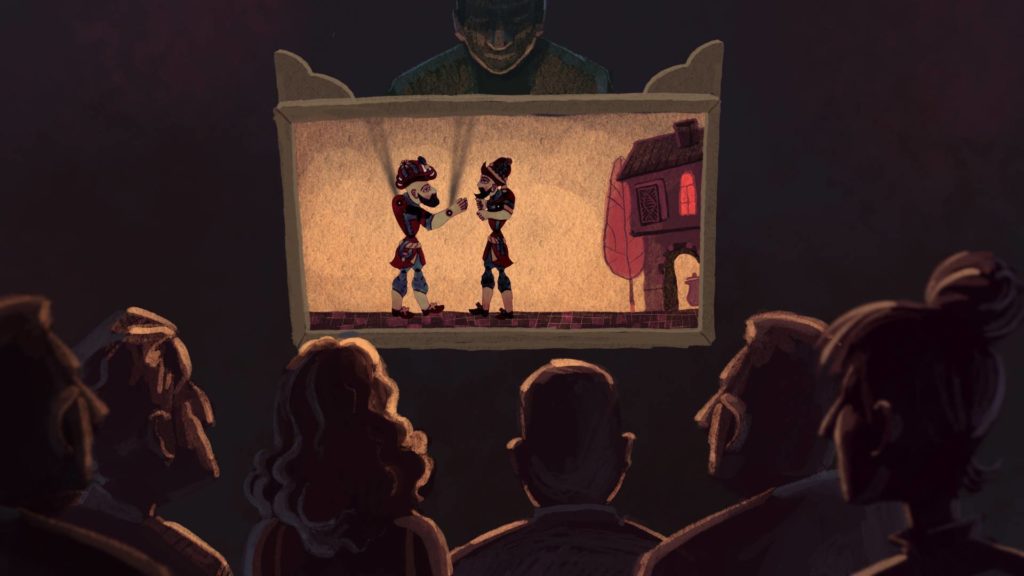
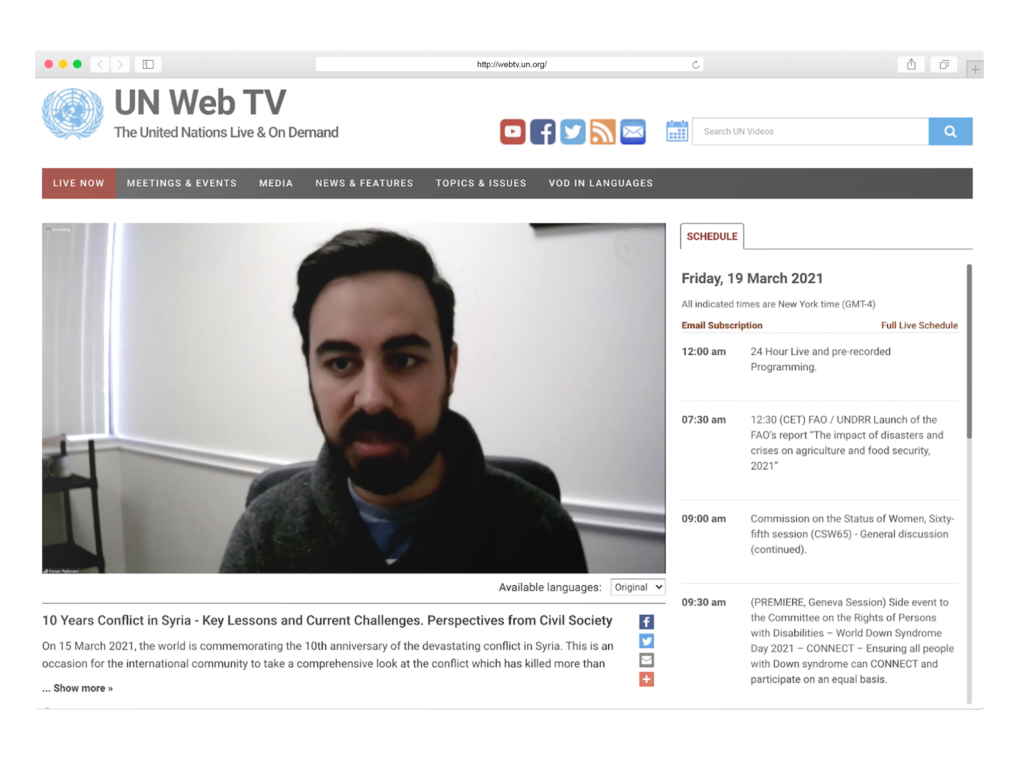
The ten year anniversary was, of course, also a heartbreaking moment; a time to remember the countless lives lost and the utter failure of the international community to act to stop the atrocities that continue to this day.
The Syria Campaign’s advocacy manager, Kenan Rahmani, spoke on a UN panel and Al Jazeera news about this failure and urged those in power to act.
“Ten years since the Assad regime and its allies, Iran and Russia, responded to peaceful protesters with bullets, siege, bombs, torture, and chemical weapons… Ten years of witnessing our friends getting killed and our homes being destroyed. Ten years since the world started looking away from the horrors because it was too easy to come up with lies and excuses to avoid doing the right thing. Ten years of impunity, of empty ‘never again’ statements, and utter failure by the United States and the international community to save the Syrian people”
Kenan Rahmani, Senior Advocacy Advisor, The Syria Campaign
The detention and disappearance of peaceful activists, journalists, medics – or anyone in the wrong place at the wrong time – continued throughout 2021 in flagrant disregard of international law.
According to the Syrian Network for Human Rights (SNHR) 2,218 people, including 85 children, were arbitrarily arrested or detained in 2021. The regime’s widespread and systematic use of enforced disappearance and torture is designed to suppress dissent or silence anyone who dares to challenge it.
However many families of the disappeared and survivors refuse to be silenced. In February, they stepped up their demands to the international community, coming together to launch a Truth and Justice Charter, which sets out the demands which must be met for true justice to be done.
The road to peace, recovery, and reconstruction in Syria and for the Syrian people starts with establishing the truth and ensuring justice and accountability for these grave violations. No negotiations or peace process can succeed while the families of detainees and the missing are denied knowledge of the fate of their loved ones
Truth and Justice Charter
Members from Families for Freedom and Caesar Families Association were in Koblenz, Germany the same month to witness the first step towards justice of some kind. The conviction of former Syrian intelligence officer Eyad al-Gharib for complicity in crimes against humanity was historic because it was the first time a court recognised the regime’s use of systematic torture but it was also a far cry from the comprehensive justice so many are calling for.
Sedra Alshehabi stood outside the court carrying a placard bearing a photo of her missing father, Ali, and the message: “First step, done. But my father and 130,000 are still detained”. The families’ response to the trial was covered by The Washington Post, Vice, DW, and other media outlets.
Wafa Mustafa, a former detainee and activist campaigning for the release of her father from Assad’s jails, reflected on the Koblenz verdict when she gave evidence to the UN General Assembly in March. “It is a first step but it should be Assad himself on trial,” she said, calling for a comprehensive international justice process for Syria, which is being blocked at the UN Security Council by Russia and China.
“I myself was detained at the age of 21 for daring to dream of a free and just Syria. I am 30 now and I have spent the ten years since my release demanding justice against the Assad regime and other groups who continue to use detention as a weapon of war.
“When I think of the young women I left behind in prison, I wonder if they ever saw freedom again. I fear what they went through in those cells, where women are systematically raped and humiliated.”
It is for all these women and thousands of others that families laid hundreds of landline phones on the cobbles of a Berlin square during an event with Families For Freedom, the Association of the Detainees and Missing of Sednaya Prison (ADMSP) and the Caesar Families Association to mark the Day of the Disappeared in August. The phones were a visual reminder of the agony the families of detainees go through as they wait for any news of their missing loved ones.
Mariam al-Hallak of the Caesar Families Association, whose son Ayham Ghazoul was killed in detention, reflected on the event in an opinion piece for Al Jazeera.
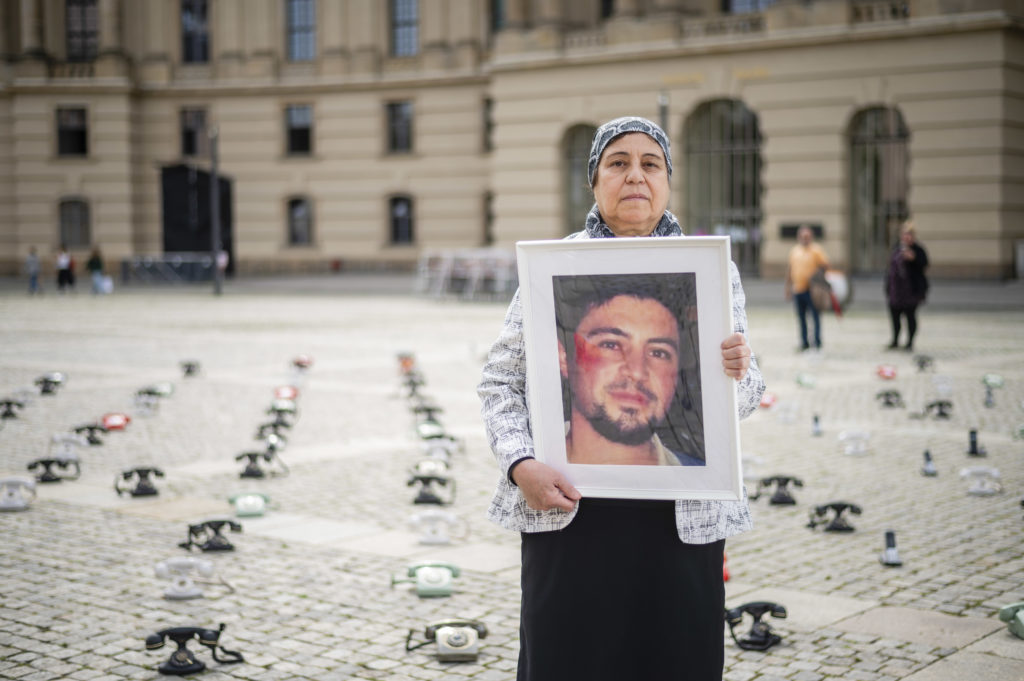
“One of the hardest things we go through as families of the disappeared is the wait. For many years we have been waiting for answers, for any clue about the fates of our loved ones, and for justice and accountability…
“I need to know where my son is so I can bury him and sit next to his grave. This is why I wait by the phone every day hoping for some sort of information about where his body might be. Nothing can bring back my son, but burying him would ease my pain and provide me with a place where I can grieve and tell him what I have wanted to tell him for years.”
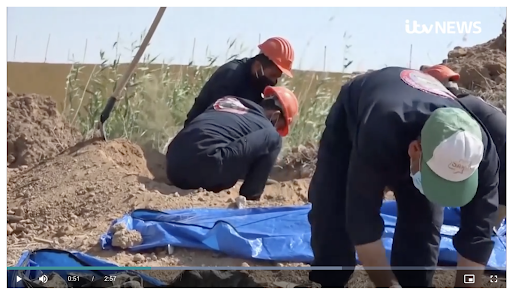
Part of the search for answers is the heroic work being done by the Syrian Missing Persons and Forensic Team on the ground in northeast Syria to piece together information about the thousands of people kidnapped by ISIS with evidence discovered in former prisons or mass graves in the region. In 2021, we ran a workshop session with some of the team to help them explore the story of their work.
In May, we expanded the interactive Arabic and English maps of mass graves and prison locations in the northeast, a visual documentation of the crimes committed as families continue to call for a more concerted search for their loved ones.
More than 1000 family members also wrote to the U.S. administration asking them to do more to find their missing loved ones.
“We write to you filled with pain, struggling with aching hearts for our sons, daughters, wives, husbands, mothers, and fathers. We have the right to know the fates of our loved ones and do all we can to search for them every day. However, we cannot do it alone and it is the responsibility of the United States and its allies to lead the search,” they wrote.
The campaign for justice and accountability was underpinned by new research and online events. In May, the groups that came together around the Charter, came together again to launch a new study, Humans not Numbers: The Case for an International Mechanism to Address the Detainees and Disappeared Crisis in Syria at a private meeting with government representatives and a public event.
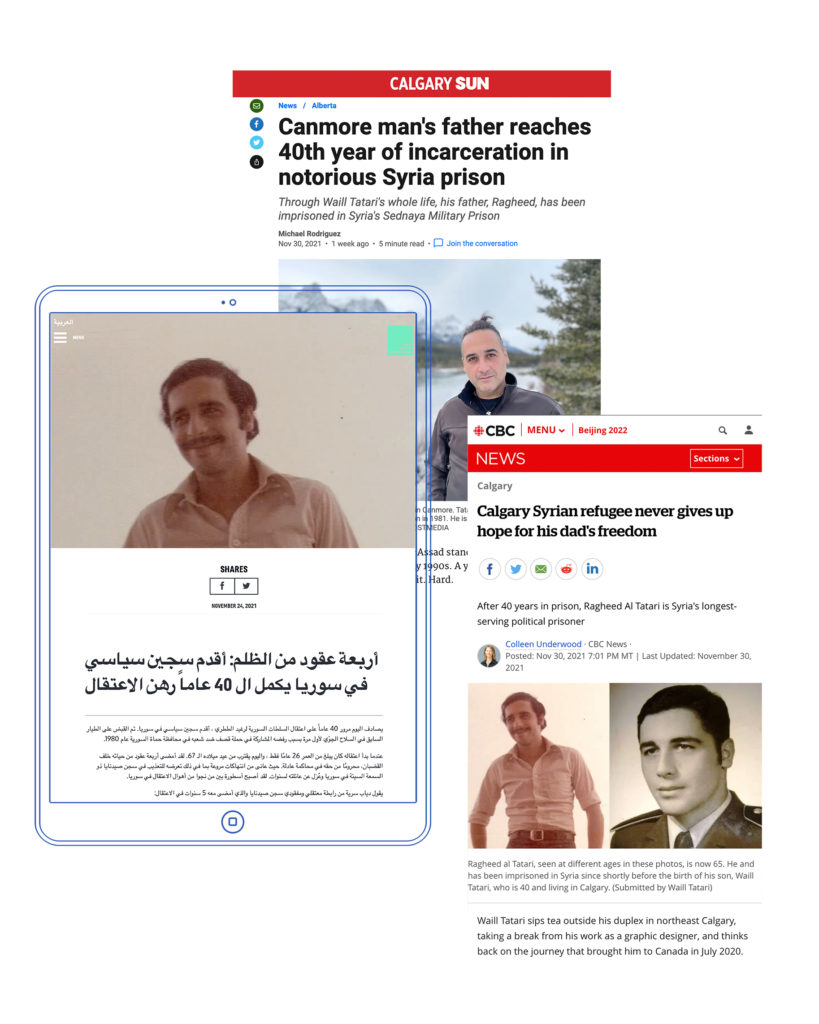
In November, we partnered with ADMSP on a campaign for the release of Ragheed al-Tatari, Syria’s longest serving political prisoner, who has been held in detention by the Syrian regime for over 40 years.
In October, we visited ADMSP’s Family Center and reported on their support to survivors of torture and detention.
“Working with The Syria Campaign was wonderful because our visions are aligned. We are both determined to involve survivors in advocacy work and campaigning. The Syria Campaign team provided wonderful trainings for survivors of Syrian detention centers and family members of the forcibly disappeared. We look forward to helping them reach the largest possible number of the public and decision-makers.”
Diab Serrih, co-founder of the Association of Detainees and the Missing in Sednaya Prison
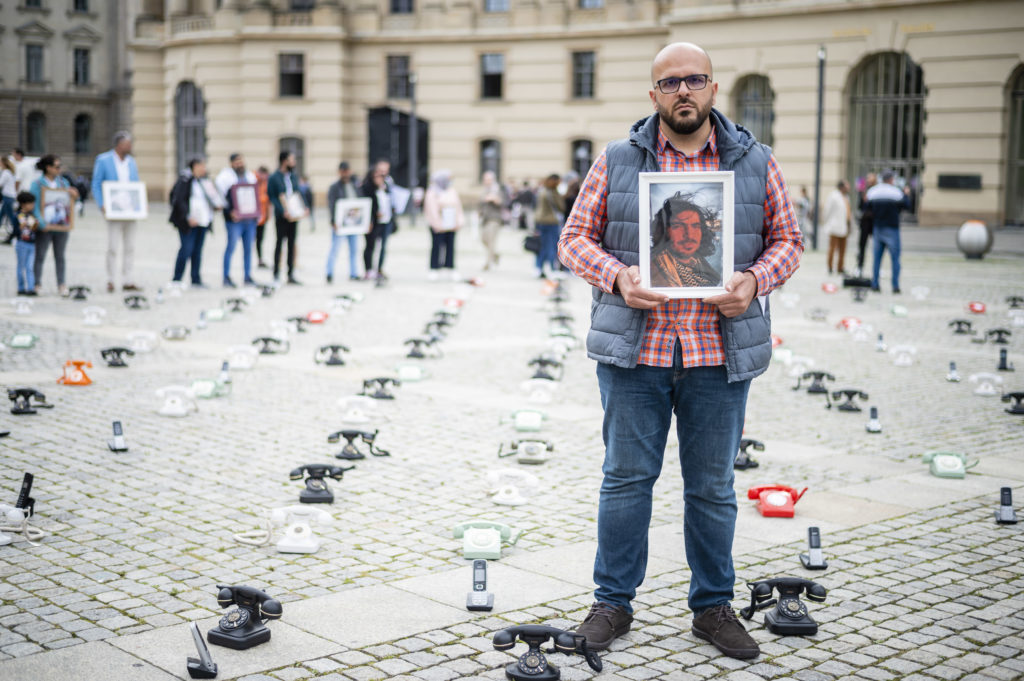
In June, The Syria Campaign and the Human Rights Foundation hosted a RightsCon event Syria: the most documented conflict in history and how tech is pursuing justice. Every year RightsCon brings together activists, business leaders, policy makers, technologists, and journalists from around the world to take action on human rights in the digital age and in 2021 we discussed how tech has the power to transform how justice is delivered.
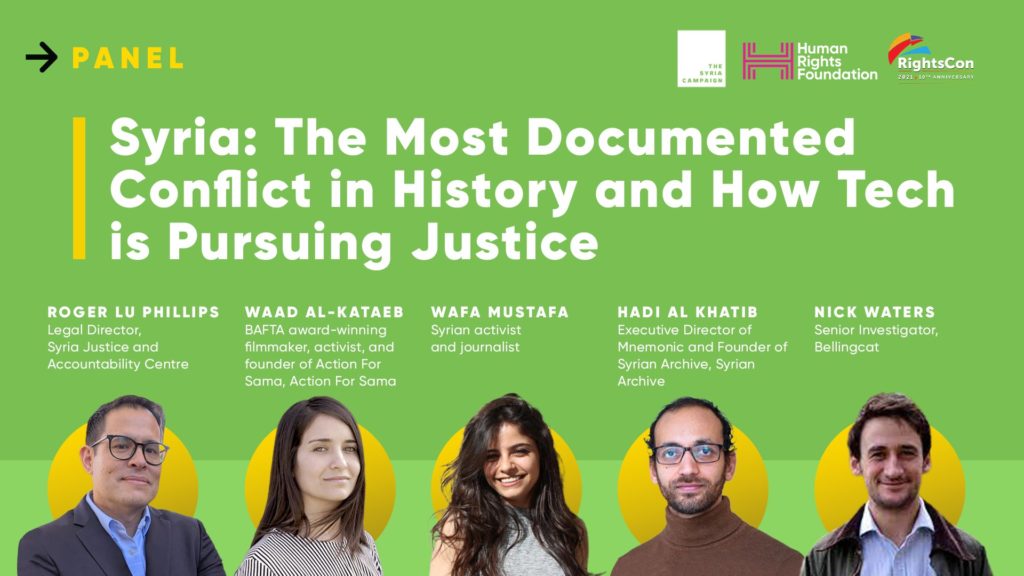
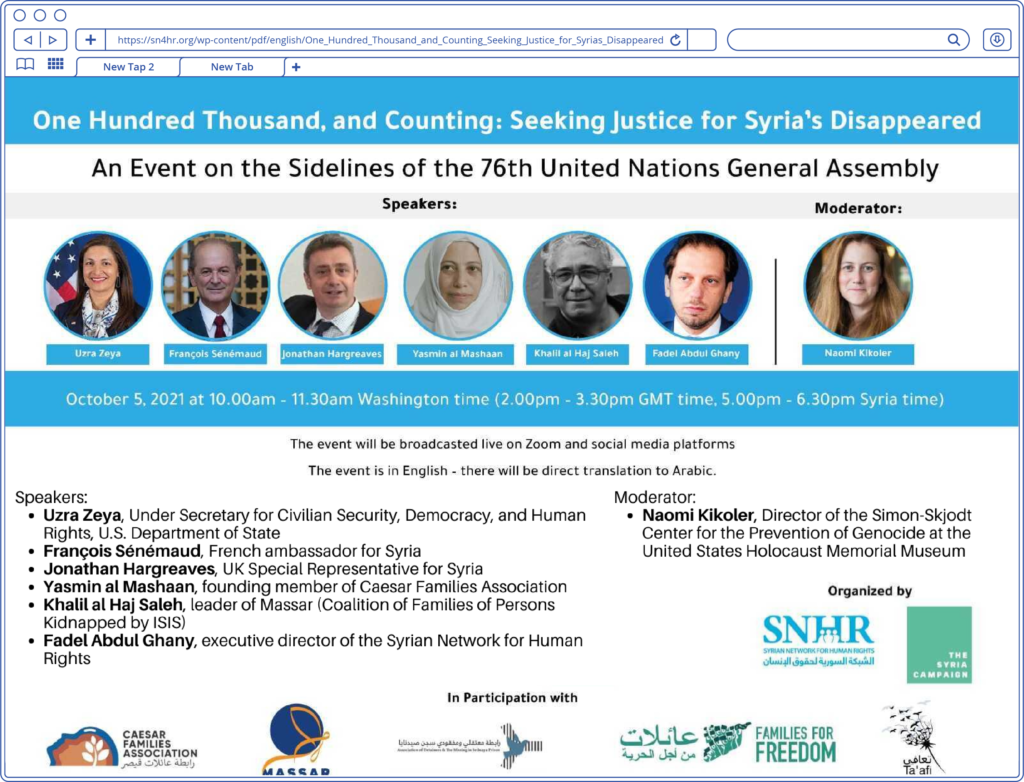
In October, we co-hosted a side event at the UN General Assembly, alongside SNHR, ADMSP, Families for Freedom, CFA, Massar and Ta’afi. “One Hundred Thousand, And Counting” assessed progress on freeing detainees, justice and accountability and the prospects for peace. Policy makers from the US, French and UK governments, Yasmin al Mashaan of Caesar Families Association and Fadel Abdulghany of SNHR all spoke.
Yasmin al Mashaan said:
“We’re waiting for justice and the cost of this waiting is unimaginable. Every day families lose brothers and sisters, under bombardment or torture. The charter for truth and justice is a road map of our demands as families, as so far the UN hasn’t made progress.”
“We are the teachers of students in northwest Syria who are deliberately targeted in their homes, classrooms and as they walk to school. We go to work afraid of another attack, and of another traumatizing day, which we know will affect our pupils for the rest of their lives,” wrote more than 180 educators in October after four months of repeated regime and Russian attacks against hospitals, schools, markets and residential homes.
According to SNHR, across Syria 1,271 civilians were killed throughout 2021 by parties to the conflict including 299 children.
The Syria Campaign worked hard to keep the spotlight on human rights abuses in Idlib by providing regular updates to our supporters, journalists and social media followers and sending advocacy letters or organising meetings for policy makers, urging action to protect civilians.
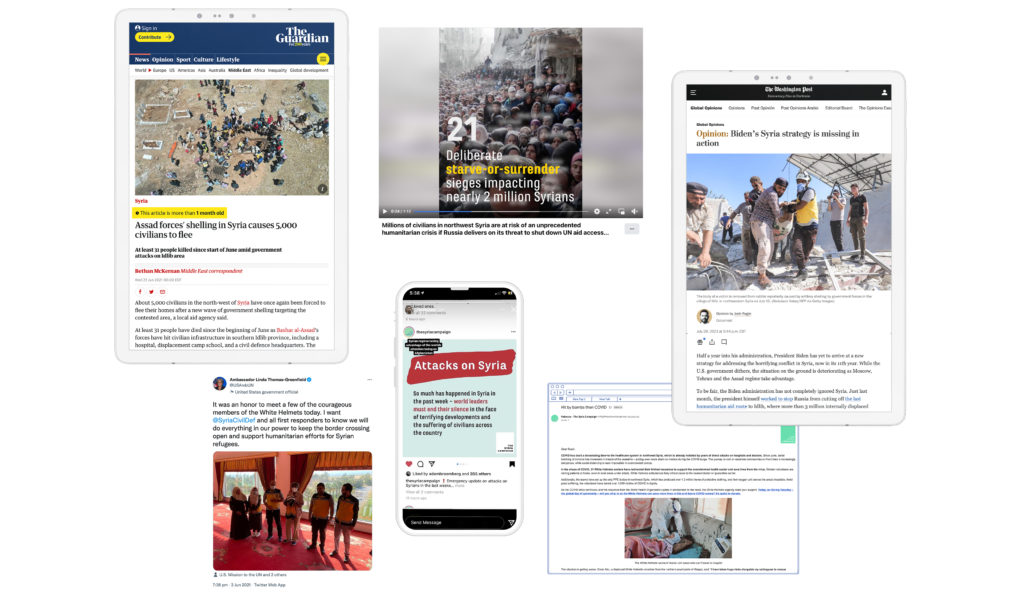
We are particularly proud of our advocacy efforts, alongside child protection organisation Hurras, to improve parental leave pay for teachers. Teachers take enormous risks to travel and teach in schools, but they love their work and choose to devote so much of their lives to providing an education to Idlib’s children. Until this year, they did not receive the parental leave pay they deserved.
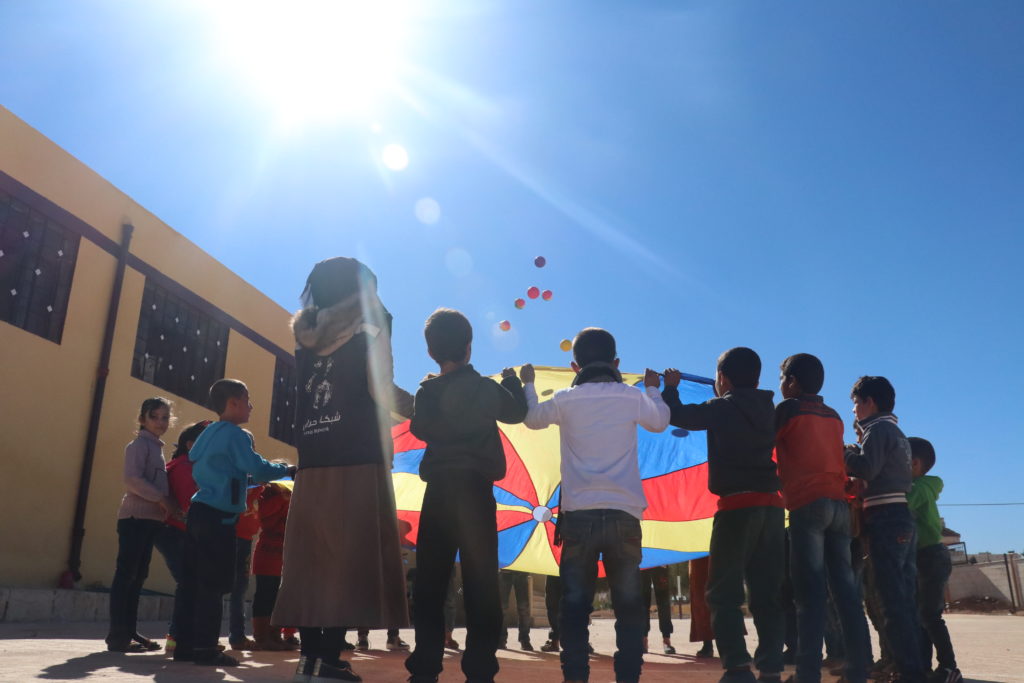
“For the first time since the onset of the Syrian response, female staff now receive pay for their maternity and other leaves. This was very well received by female teachers and we have seen more female staff applying for leadership positions in the formal education sector. A group of women leaders continues to grow in strength thanks to the support from The Syria Campaign. They have ambitious targets for 2022 and there is a lot to do to reach the equity we all aspire to achieve.”
Alaa Zaza, Manahel Syria Education Programme
Layla Hasso, from the Hurras Child Protection Network in northwest Syria said:
“In addition to demanding better working conditions for female teachers, The Syria Campaign helped build the capacity of our advocacy team working closely with a group of female leaders in education. Today our team has a clearer vision and is capable of pursuing successful efforts to advocate for a better education in Syria thanks to their support. The Syria Campaign has also helped to amplify the voices of teachers and education leaders, especially women, within the media, so that the whole world can hear their plight.”
Deadly attacks in Idlib have continued with bombs hitting hospitals as well as schools. Salem Abdan, Idlib’s health director, told The Guardian: “June has brought many attacks on civilian homes and buildings, putting a lot of pressure on our hospitals, which are already struggling. The increase in attacks now, combined with the [UN security council vote on cross-border aid] approaching, poses a threat that the health and relief sector could collapse completely.”
We worked with humanitarian partners to highlight this threat, meeting with Congressional staffers to push for a resolution at the UN Security Council.
We urged The UN Security Council to reauthorise UN cross-border aid into Syria through Turkey and Iraq adding to the groundswell of pressure on the international community to save lives. On 9 July the crossing that allows aid supplies and COVID vaccinations into northwest Syria was extended for another 12 months, however the needs of millions of displaced people in the area continue to surpass the aid response.
The Syrian regime’s two-month long bombardment and siege of the semi-autonomous district of Daraa al-Balad on the Syrian-Jordanian border forced 38,000 people from their homes and blocked the delivery of lifesaving supplies sparking a humanitarian crisis. By imposing the siege the regime resorted once again to their well-known “surrender or starve” tactics in a brutal strategy meant to punish Daraa’s residents for refusing to participate in the May “sham” presidential election.
Activist from Daraa, Yacoub Alzoubi, said:“The regime attacked Daraa al-Balad with heavy shelling and put it under tight siege for 79 days, denying food, medicine and basic necessities from entering the city, all to pressure civilians to surrender. Displaced people have started going back to their homes and are shocked by the massive destruction of houses. Now people fear there will be mass arrests and intimidation of residents. The Syrian army robbed civilian homes before they left. They stole belongings, doors and windows, even the electricity cables were pulled and stolen.”
We connected activists with media outlets and amplified their calls for help on social media, as well as advocating to policy makers to act in the face of almost complete silence from the international community.
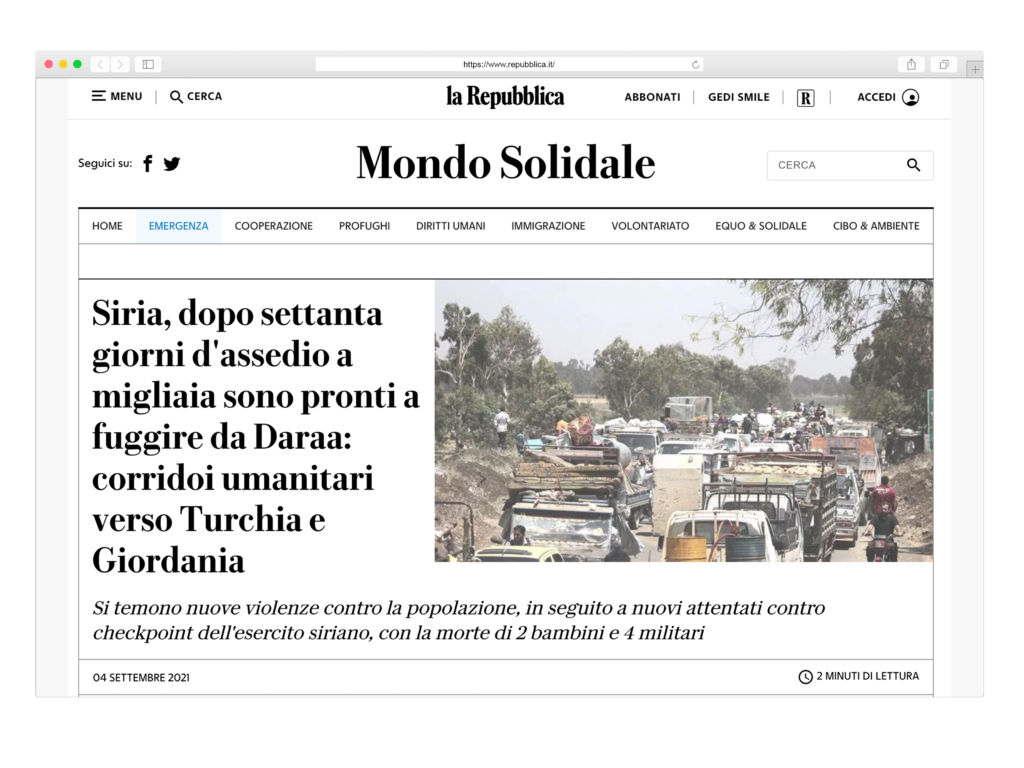
Supporting the only centre for Down syndrome children in Idlib
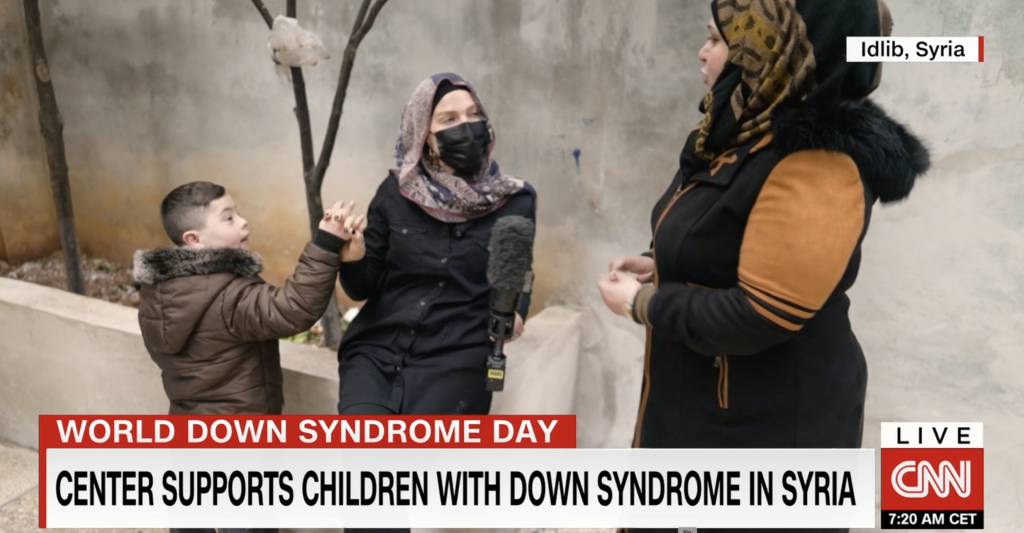
Children with Down syndrome in Idlib suffer badly from a lack of specialist care – but there is one center that is providing much-needed speech and physical therapy to over 35 children. Early intervention can mitigate the majority of the developmental challenges that children with Down syndrome face, but the centre operates on a shoe-string and when CNN highlighted the needs of the children, we launched a crowdfunding campaign to help raise funds. The Syria Campaign’s supporters stepped up in response donating $5000 to the centre.
“I want to thank The Syria Campaign so much for supporting our center. The donations have helped us resume our work with the children at a time when we didn’t have any other source of support – all of us are volunteers paying the center’s expenses from our own pockets. Some of the donations were used as incentives for our volunteers. Some were used to cover transportation for children who live far from the center. Some were used to buy chairs, desks, and games that helped the children with their learning. They might be small donations but it had such a huge impact on the children and boosted everybody’s morale. We appreciate the quick response of The Syria Campaign in launching this beautiful campaign and the complete transparency in your work.”
Abdullah Mohamed, founder and manager of the Down Syndrome Center
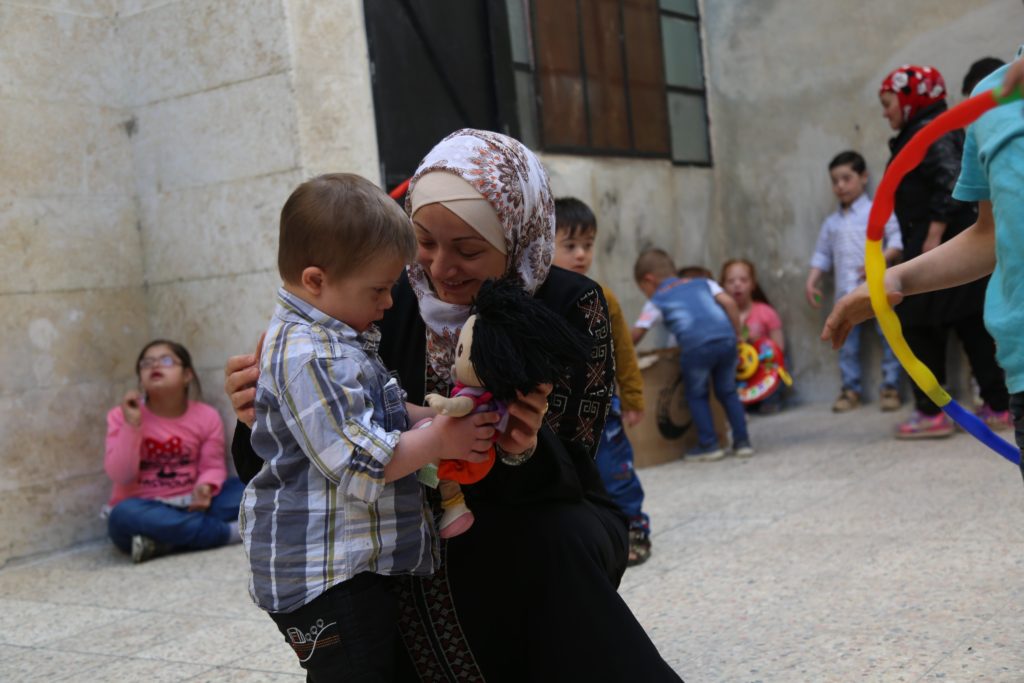
Despite all the evidence to the contrary, in March Denmark declared Damascus and the surrounding areas to be safe for refugees to return home and more Syrian refugees were told to leave Denmark and forced to appeal to keep their residency. Since 2019, around 850 Syrians have had their asylum status reassessed, and 100 have lost their appeals and right to stay in Denmark – with a significant uptick in 2021.
Denmark’s racist policy, that disproportionately affects women and elderly people, sets a dangerous precedent for other countries that host refugees. The Syria Campaign’s supporters, Syrians and human rights defenders around the world responded with outrage and close to 18,000 people signed a petition urging Denmark to reverse its shameful decision. The fact is, no part of Syria is safe to return to and no one should be forcibly removed from their place of living.
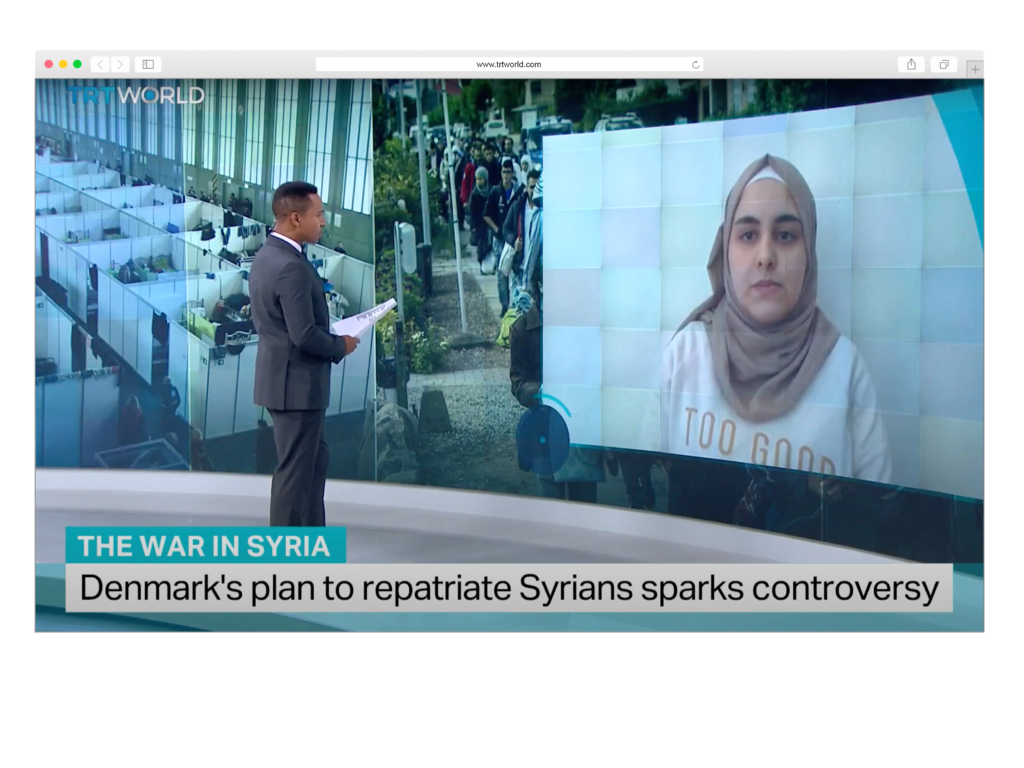
Influential people such as Helena Christensen, Riz Ahmed, Gillian Anderson and Lena Headey got behind the campaign and many mainstream media outlets covered the story.
They covered the case of Aya Abu Daher, one of the hundreds of Syrians told to leave her family behind in Denmark or be forced to move into an inhumane deportation camp. We supported Aya to connect with the press, write letters to European governments and meet with policy makers, asking them to add their diplomatic pressure and commit to protecting refugees.
Thankfully Aya won her appeal against the government, following huge media and public attention on her case, and she was granted residency in Denmark. Our campaign carried a clear message to the international community: any government that seeks to force Syrian refugees to forcibly return to Syria will face strong opposition. We continue to fight for all Syrian refugees to be protected.
“Denmark’s actions are shameful,” said Dr Hala Al Ghawi who is a member of Families for Freedom and the Syrian Association for Citizens’ Dignity. “Any person who leaves their country is seeking security and a better future for them and their children. Denmark doesn’t only have an obligation to protect the human rights of people under bombing and shelling. It must protect people from human rights violations of any kind and refugees face so many different dangers if they return. As long as Denmark cannot protect refugees from arrest, forced disappearance and torture it has no right to send them to Syria, where violations are being committed daily and hundreds of thousands of people are still missing.”
We joined Action for Sama to mark World Refugee Day in June by creating a mural in London, with the message: “We dared to dream and we will not regret dignity”.
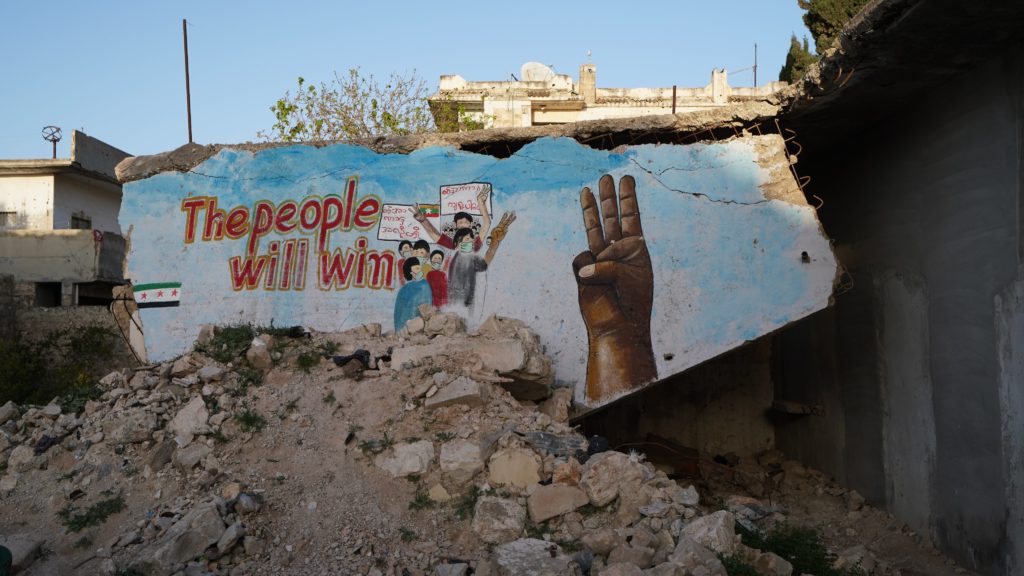
Solidarity with Myanmar
In April we collaborated with Idlib-based artist Aziz Asmar, who then painted a mural in solidarity with protestors in Myanmar. It has become one of our most shared posts ever on Twitter and Facebook, where it received huge numbers of shares and messages of gratitude from Myanmar activists.
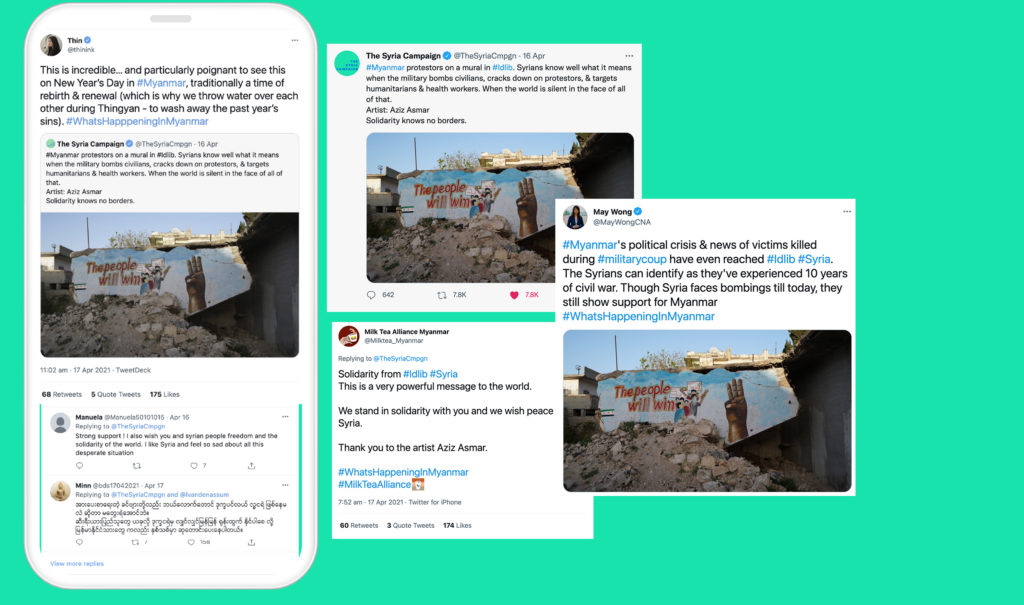
Thank you
We are grateful to the individuals and foundations whose generosity and commitment make possible every campaign we launch, story we tell, and advocacy meeting we hold.
We thank our board of directors for their guidance and expertise during a challenging year.
Our global community of supporters is at the core of our work and impact. By continuing to stand in solidarity with Syrian civilians long after the world’s media and decision makers have turned away, they are building power behind the Syrian people’s demands for rights and justice.
Our deepest gratitude goes to the humanitarians, doctors, nurses, storytellers, educators, feminists, artists, human rights defenders, and every Syrian who hasn’t given up on the struggle for freedom and justice. We are honoured to work alongside them. Their courage and determination are our North Star.
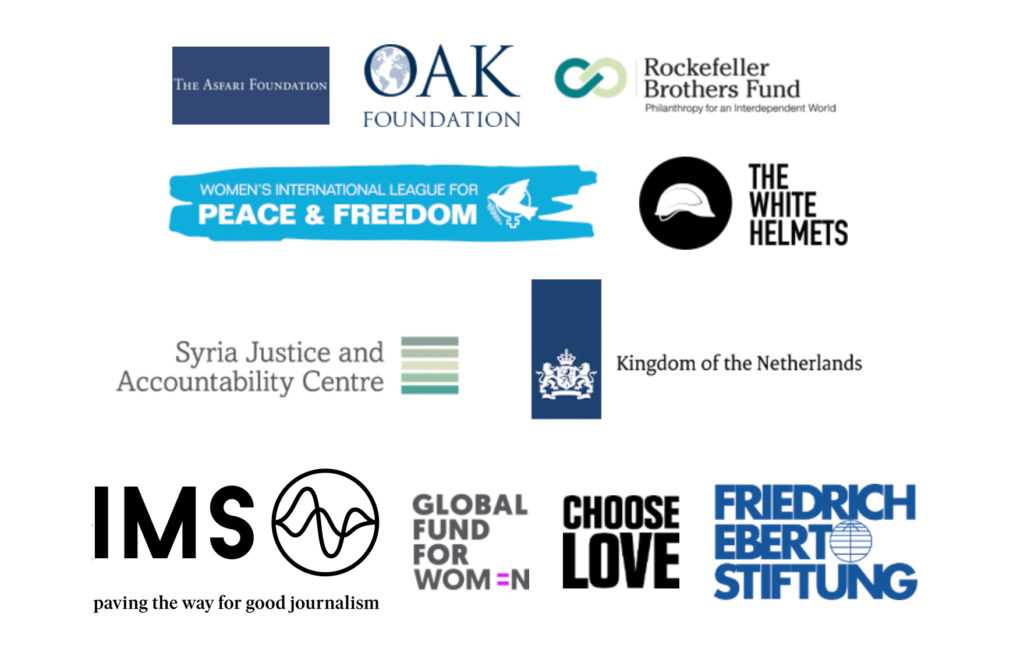
The contents of this annual report are solely the responsibility of The Syria Campaign and do not reflect the views of our partners.
